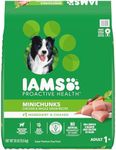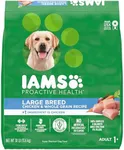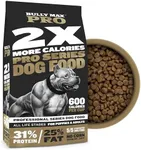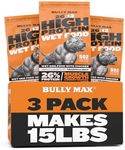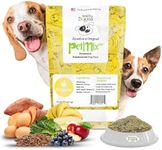Buying Guide for the Best Dry Dog Foods
Choosing the right dry dog food for your furry friend is crucial for their health and well-being. The right food can help maintain their energy levels, support their immune system, and keep their coat shiny and healthy. When selecting dry dog food, it's important to consider several key specifications to ensure you're providing the best nutrition for your dog. Here are some important factors to consider and how to navigate them.IngredientsIngredients are the building blocks of any dog food and are crucial for providing the necessary nutrients. Look for high-quality ingredients such as real meat, vegetables, and whole grains. Avoid foods with fillers like corn, soy, and wheat, as well as artificial preservatives, colors, and flavors. If your dog has specific dietary needs or allergies, choose a food that caters to those requirements.
Protein ContentProtein is essential for your dog's muscle development and overall health. The protein content in dog food is usually listed as a percentage. For puppies and active dogs, higher protein content (around 25-30%) is beneficial. For older or less active dogs, a moderate protein content (18-25%) is sufficient. Always ensure the protein source is high-quality, such as chicken, beef, or fish.
Fat ContentFat provides energy and supports healthy skin and coat. The fat content in dog food should be balanced according to your dog's activity level and age. Active dogs and puppies may require higher fat content (around 15-20%), while older or less active dogs may need lower fat content (around 10-15%). Ensure the fat comes from healthy sources like fish oil or chicken fat.
Fiber ContentFiber aids in digestion and helps maintain a healthy weight. The fiber content in dog food is usually around 3-5%. Higher fiber content can be beneficial for dogs with digestive issues or those needing weight management. However, too much fiber can lead to digestive problems, so it's important to find a balance that suits your dog's needs.
Life StageDifferent life stages require different nutritional needs. Puppy food is formulated to support growth and development, with higher protein and fat content. Adult dog food is balanced for maintenance, while senior dog food often includes joint support and lower calories. Choose a food that matches your dog's life stage to ensure they receive the appropriate nutrients.
Breed SizeDog foods are often formulated for specific breed sizes. Small breed dog food typically has smaller kibble and higher calorie content to meet their fast metabolism. Large breed dog food may include joint support and controlled calorie content to prevent obesity. Choose a food that matches your dog's breed size to ensure they can easily eat the kibble and receive the right nutrition.
Special Dietary NeedsSome dogs have special dietary needs due to allergies, sensitivities, or health conditions. There are dog foods formulated for specific needs such as grain-free, limited ingredient, or hypoallergenic diets. If your dog has a specific condition, consult with your veterinarian to choose a food that addresses their dietary requirements.



